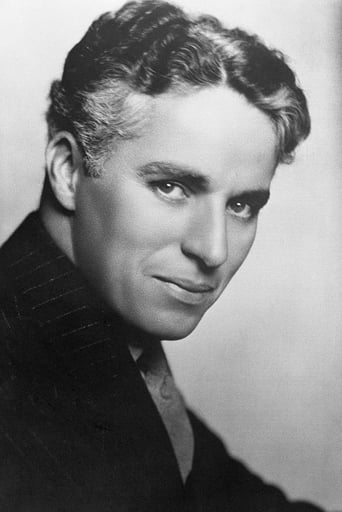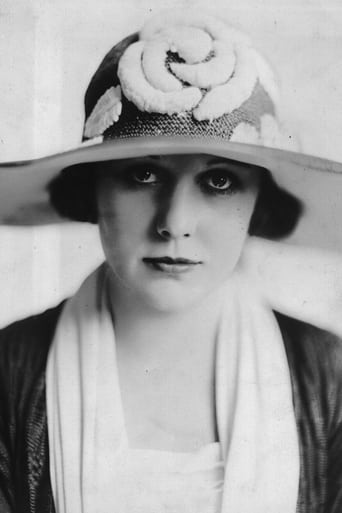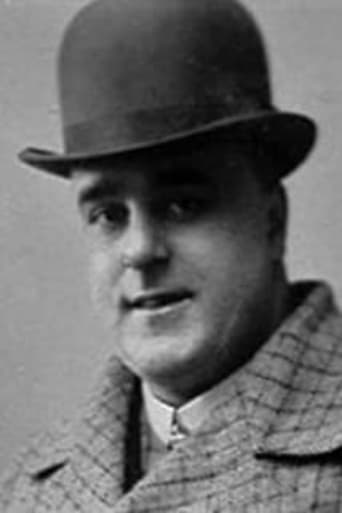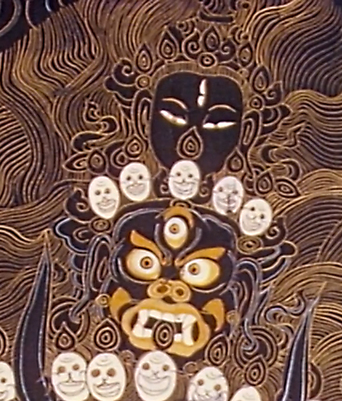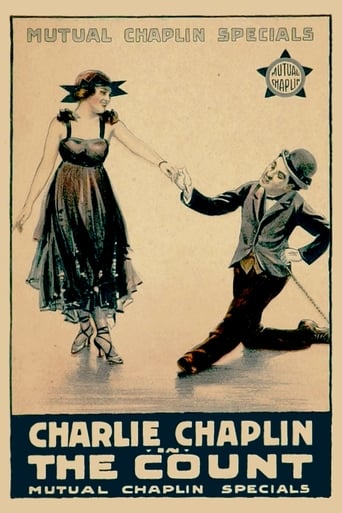
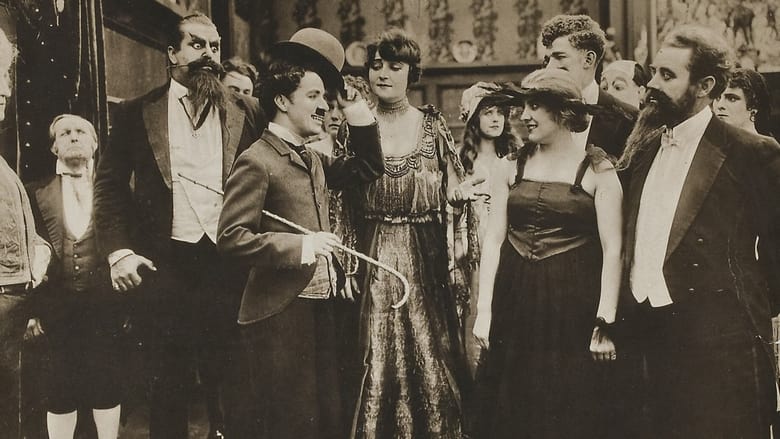
The Count (1916)
A tailor's apprentice burns Count Broko's clothes while ironing them and the tailor fires him. Later, the tailor discovers a note explaining that the count cannot attend a dance party, so he dresses as such to take his place; but the apprentice has also gone to the mansion where the party is celebrated and bumps into the tailor in disguise…
Watch Trailer
Cast


Similar titles
Reviews
Am a big fan of Charlie Chaplin, have been for over a decade now. Many films and shorts of his are very good to masterpiece, and like many others consider him a comedy genius and one of film's most important and influential directors. From his post-Essanay period after leaving Keystone, 'The Count' is not one of his very best but is one of his best early efforts and among the better short films of his. It shows a noticeable step up in quality though from his Keystone period, where he was still evolving and in the infancy of his long career, from 1914, The Essanay and Mutual periods were something of Chaplin's adolescence period where his style had been found and starting to settle. Something that can be seen in the more than worthwhile 'The Count'. The story is more discernible than usual and is never dull, but is sometimes a bit too busy and manic.On the other hand, 'The Count' looks pretty good, not incredible but it was obvious that Chaplin was taking more time with his work and not churning out countless shorts in the same year of very variable success like he did with Keystone. Appreciate the importance of his Keystone period and there is some good stuff he did there, but the more mature and careful quality seen here and later on is obvious.While not one of his most hilarious or touching, 'The Count' is still very funny with some clever, entertaining and well-timed slapstick and has substance and pathos that generally were not there with Keystone. It moves quickly and there is no dullness in sight. The ending is great fun.Chaplin directs more than competently, if not quite cinematic genius standard yet. He also, as usual, gives an amusing and expressive performance and at clear ease with the physicality and substance of the role. The supporting cast acquit themselves well, particularly Eric Campbell.Overall, very enjoyable. 8/10 Bethany Cox
This is a somewhat surrealist comedy of manners. What if the most nonsense tailor, after having been fired, pretends to be a rich count in a fancy party, stealing the place of his ex-boss (Eric Campbell)? They both are interested in the same woman, who is predictably Edna Purviance, in a Popeye-Bluto-OliveOil-type triangle. Very funny and campy short film. It lacks the emotional element of other films from Chaplin, but the gestures of Charlie are hilarious as often. The spectator may expect a lot of action and trouble, which come from the insane behavior of the tramp as a tailor, from the confusions caused by the party crash, the lack of etiquette from the working class guy, the crush for two women in the party, and the rivalry between ex-boss and ex-employee.
In the cinema of Charlie Chaplin, silly facial hair was like a kind of comedy insurance. If all Charlie's antagonists looked suitably ridiculous, the pratfalls would fall that little bit harder and the laughs would be that little bit louder. The Count is a good picture for silly facial hair, from the flapping fuzz of the band leader, to the upturned curiosity of Count Broko, to the wispy behemoth adorning Eric Campbell. Chaplin's reliance on beards and moustaches here gives a clue as to the fact that this is not among his best Mutual Pictures.It appears he was aiming for here a story of broader social goings-on, with a plot that is funny in itself as Chaplin and Campbell double-cross each other, both trying to pretend to be a count so they can get in with Edna Purviance, until the real count turns up, and mayhem ensues. It's a good idea, but Chaplin is at this stage focusing on milking each scene for potential gags, rather than making the whole thing flow seamlessly. Consequently The Count has a rather disjointed feel, lurching awkwardly from a boss/apprentice set-up of the kind with which Chaplin normally sustained a whole picture, to an elicit meeting between Chaplin and some frumpy cook, to the rather contrived situation in which counts are impersonated. Neither the plot nor the tramp character really seems consistent, and it runs almost like a Charlie Chaplin clip show.But Chaplin was nevertheless at the top of his game as far as pure comedy went, and there are some of these "clips" are pretty good. The opening scene is a great example of the triumph of absurd ideas over broad slapstick, with Charlie as a tailor who measures a woman's ear, smile and finger. There's a very smooth and pretty ballroom scene, punctuated by a few arse-kicking gags. In the frantic finale there is a rather subtle but very funny juxtaposition, as the band continues to play gently in the background as the other characters run around and fight each other in the foreground. Luckily composer Carl Davis, in his new score for the Mutual films, picks up on this and keeps going with the sedate band music rather than a typical chase theme. And those beards, backups though they may be, do work as a touch of comic sparkle.So yet again, we come to the all-important statistic – Number of kicks up the arse: 9 (4 for, 5 against)
This two-reel comedy, one of a dozen Chaplin made under his Mutual contract, offers a story line he followed time and again throughout his career: lower class Charlie fakes his way unto upper class society under an alias, fools people for a while, then wreaks havoc. Sometimes Charlie's fraud is deliberate (as in this film), while on other occasions people mistake him for something he is not, but whatever the case the idea was one Chaplin used regularly, starting with an early Keystone of 1914, Caught in a Cabaret, and recurring in other short comedies of 1915-16 such as A Jitney Elopement and The Rink. The premise turns up as late as 1940 in The Great Dictator, although in that instance the farcical aspect of the plot has turned into a darker political statement. Without getting overly analytical about the matter, it would appear that this scenario held some sort of deep meaning for Chaplin, who grew up in poverty and yet wound up wealthy and celebrated, hobnobbing with some of the most famous people in the world. Was this man insecure about the wealth and power he'd earned? It's not so far-fetched to wonder if Chaplin, recalling his roots in the London slums, might have sometimes felt like a fraud when he found himself dining with the likes of Winston Churchill, Lady Astor or Bernard Shaw.Anyhow, getting back to the matter at hand: The Count stands as one of Charlie's lightest and most playful short comedies, perhaps not one of his very best but highly enjoyable nonetheless. There's a lot of good byplay between pint-sized Charlie and his most memorable "heavy," the enormous Eric Campbell, who wears an outrageous beard this time around. Campbell plays a tailor and Charlie is his assistant, soon fired for ineptitude; but before long the former apprentice gets mixed up in the conniving tailor's scheme to impersonate a count, in order to court a wealthy heiress (Edna Purviance). I especially enjoyed the bit when Campbell explains his scheme to Charlie, and punctuates the speech with his elbow in a "Get it?" gesture, until Charlie finally slides a wooden chair into place to protect himself. Through various complications Charlie himself is mistaken for the count, and receives royal treatment at a grand party at Edna's mansion, while his boss is forced to serve as his assistant. The party is the setting for a number of amusing comic set-pieces, including a dinner of spaghetti and watermelon (when did you last see these dishes served together?), and a dance in the ballroom. For me, the dance is the film's highlight, as it displays Chaplin at the peak of his physical skill, sliding and gliding about with almost supernatural agility. Only Mickey Mouse could move so well, and with such comic grace!The Count may not rank with Chaplin's greatest short comedies, but if any of his contemporaries had made this same film it would probably be regarded as something special. It's hard for me to be objective about this particular movie because The Count was one of the first Chaplin comedies I ever saw, way back in grade school, when I borrowed an 8mm print from my local library, threaded it up on my projector, and threw the beam onto a wall of my room. It was the first inkling I had that Chaplin's reputation as a great comedian was so well deserved, the first time I said to myself: "Hey, this guy really IS funny!"


